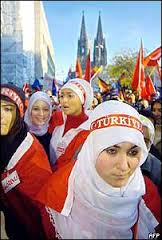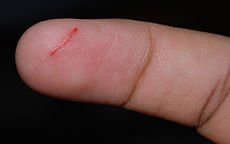 Interesting piece today on NPR on the changing situation of Turkish “guest workers” (Gastarbeiter) in Germany today. These are workers who were brought to Germany in the 1960’s with the expectation that they would go back home after a few years. But instead, the Turkish workers stayed in Germany and brought their families to join them – jobs were much better paid in Germany and the political situation in Turkey was unsettled. Today there are 2nd and 3rd generation German-Turks, who often stand between two cultures. The report indicates that increasing numbers of Turks are going back to Turkey. In contrast to the economic problems in the European Union, the Turkish economy is doing well. The earlier Turkish ardor for entering the EU has cooled considerably.
Interesting piece today on NPR on the changing situation of Turkish “guest workers” (Gastarbeiter) in Germany today. These are workers who were brought to Germany in the 1960’s with the expectation that they would go back home after a few years. But instead, the Turkish workers stayed in Germany and brought their families to join them – jobs were much better paid in Germany and the political situation in Turkey was unsettled. Today there are 2nd and 3rd generation German-Turks, who often stand between two cultures. The report indicates that increasing numbers of Turks are going back to Turkey. In contrast to the economic problems in the European Union, the Turkish economy is doing well. The earlier Turkish ardor for entering the EU has cooled considerably.
Another aspect of that movement back to Turkey has to do with the attitude changes in Germany (and Europe generally) since the economic downturn of the past few years. Racism and islamophobia have increased, as jobs become harder to come by. In Germany a group of neo-nazis murdered Turks over a period of several years. This has led to much questioning in Germany about police lack of interest and/or competence in fighting violence against foreigners from far right groups.
One of the interesting twists in the story about Turks returning to their home land is the reverse culture shock described by one of the young returnees, who had gotten used to the sense of order in Germany society: “He was surprised to find a Germanic desire for order welling up in him one day while walking down Istanbul’s teeming downtown thoroughfare, with masses of people jostling this way and that. ‘You know, I can’t understand why all the people are walking like this! And one day I was nearly to cry, “Stop! You go right and you go left!”, ‘ he says.” .Anyone experiencing everyday German life quickly sees the real life acting out of the German saying Ordnung muss sein (There must be order).

